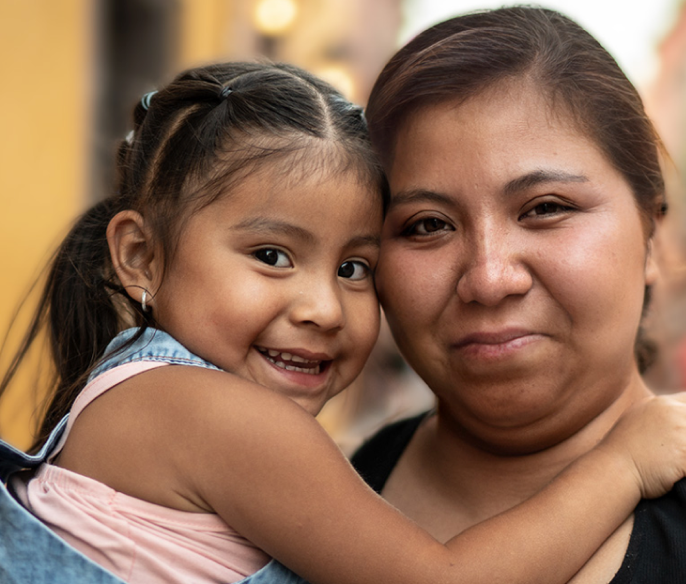
Some parents may lack the information they need.1,2
As their health care provider, you may be able to help them move forward1,2
Access to credible health information should be a right. But for some, access may be a challenge. Or, they simply may not know which sources are trustworthy.3,4 That’s why they may rely on you.1
The hesitancy scenarios offered here can help you find a relatable way to offer the reliable information parents need to make the decision to vaccinate.
What hesitancy sounds like…
“How do I know which vaccines my child needs?”


Parent:
“How do I know which vaccines my child needs?”
HCP:
“The recommended pediatric vaccination schedules are developed by experts and can be found online.5-7
You can also count on me to answer your questions. Today, it looks like your child needs [X].”
You may also be hearing…
“Where do you get your information? How do I know I can trust it?”
HCP:
“What questions do you have about today’s scheduled vaccine?”
Parent:
“Where do you get your information? How do I know I can trust it?”
HCP:
“Great question! I’m glad you asked. My goal is to ensure I have the best information to help keep your child healthy.
I always refer to the CDC immunization schedule for vaccine recommendations.6 However, I also consult the American Academy of Pediatrics and the American Academy of Family Physicians for information, as well.7
[I also refer to x, y, z articles and sites.]
Would you like me to provide you with information you can take with you to review later?”
“I thought vaccines were only for children.”
Parent:
“I thought vaccines were only for children.”
HCP:
“Vaccinations are needed at different stages of life and through adulthood to help keep you and those around you safe from preventable infectious disease.6-10
Adults will need some vaccines because immunity from certain childhood vaccines can wear off over time. Additionally, as an adult, you may be at risk for different diseases.8,10
Vaccines are an important way to help take care of your health and the health of your children.”9,11
“What happens if my child doesn’t get vaccinated?”
Parent:
“What happens if my child doesn’t get vaccinated?”
HCP:
“Vaccinations help your child’s immune system protect against certain diseases.12
Without vaccination, your child could remain at a higher risk for certain infectious diseases and the consequences of those diseases.”9
Explore other scenarios and strategies for overcoming vaccine hesitancy.
Safety concerns/general mistrust:
“How do I know vaccines are safe?”
Vaccine necessity:
“Why does my child need this vaccine? It’s not required by our school.”
“Why does my child need this vaccine? It’s not required by our school.”
All scenarios:
Download a comprehensive PDF
References
- Centers for Disease Control and Prevention. Talking with parents about vaccines. Published August 9, 2024. Accessed June 26, 2025. https://www.cdc.gov/vaccines-children/hcp/conversation-tips/index.html
- Centers for Disease Control and Prevention. Questions parents may ask about vaccines. Published August 9, 2024. Accessed January 15, 2025. https://www.cdc.gov/vaccines-children/hcp/conversation-tips/questions-parents-may-ask.html
- Goje O, Kapoor A. Meeting the challenge of vaccine hesitancy. Cleve Clin J Med. 2024;91(9 suppl 1):S50-S56. doi:10.3949/ccjm.91.s1.08
- MedlinePlus. Evaluating health information. Updated February 26, 2024. Accessed June 17, 2025. https://medlineplus.gov/evaluatinghealthinformation.html
- Centers for Disease Control and Prevention. Reasons to follow CDC’s recommended immunization schedule. Published August 9, 2024. Accessed September 10, 2025. https://www.cdc.gov/vaccines-children/schedules/reasons-to-follow.html
- Centers for Disease Control and Prevention. Recommended child and adolescent immunization schedule for ages 18 years or younger, United States, 2025. Revised October 7, 2025. Accessed October 9, 2025. https://www.cdc.gov/vaccines/hcp/imz-schedules/downloads/child/0-18yrs-child-combined-schedule.pdf
- American Academy of Pediatrics. Recommended child and adolescent immunization schedule for ages 18 years or younger, United States 2025. Updated September 17, 2025. Accessed October 6, 2025. https://downloads.aap.org/AAP/PDF/AAP-Immunization-Schedule.pdf
- Centers for Disease Control and Prevention. Recommended adult immunization schedule for ages 19 years or older, United States, 2025. Revised October 7, 2025. Accessed October 9, 2025. https://www.cdc.gov/vaccines/hcp/imz-schedules/downloads/adult/adult-combined-schedule.pdf
- US Department of Health and Human Services. Five important reasons to vaccinate your child. Reviewed May 6, 2022. Accessed May 30, 2025. https://www.hhs.gov/immunization/get-vaccinated/for-parents/five-reasons/index.html
- Centers for Disease Control and Prevention. 5 reasons it is important for adults to get vaccinated. Published July 1, 2024. Accessed January 16, 2025. https://www.cdc.gov/vaccines-adults/reasons/index.html
- US Department of Health and Human Services. Vaccine basics. Reviewed November 9, 2022. Accessed June 16, 2025. https://www.hhs.gov/immunization/basics/index.html
- US Department of Health and Human Services. Vaccines protect you. Reviewed April 4, 2024. Accessed June 17, 2025. https://www.hhs.gov/immunization/basics/work/prevention/index.html